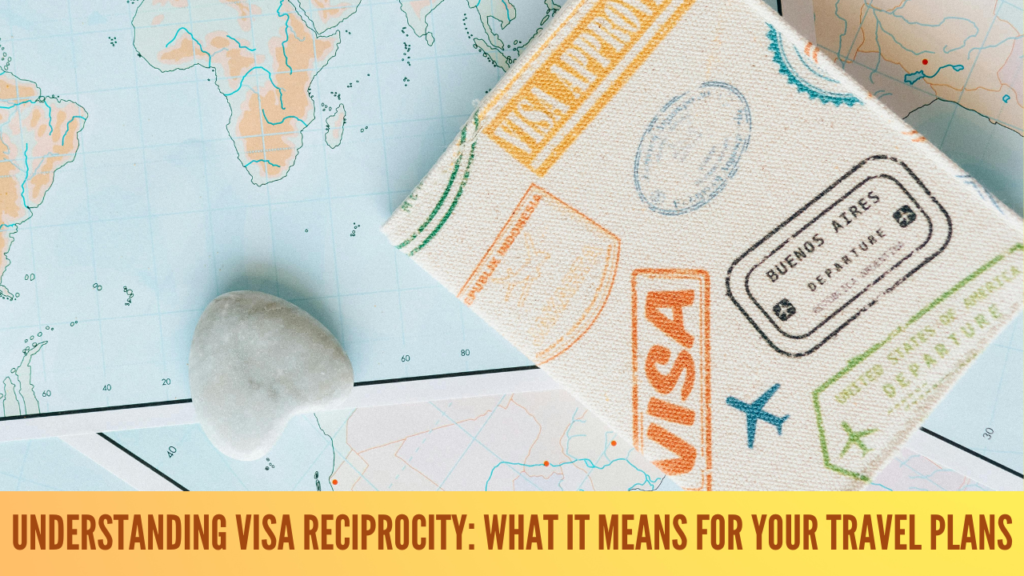
When planning international travel, one of the most crucial steps is understanding the visa requirements for the country you’re visiting. However, an often-overlooked aspect of this process is visa reciprocity—the principle that governs the visa policies between countries. In this blog, we’ll explain what visa reciprocity is, how it impacts your travel plans, and why it’s essential to stay informed about it.
The practice of nations applying comparable visa regulations to one another in accordance with their mutual agreements is known as visa reciprocity. It simply means that different countries frequently have similar visa requirements. If one nation has stringent visa requirements for its nationals, another nation may follow suit with comparable limitations or conditions. On the other hand, if one government grants a particular nationality a visa-free or more lenient visa policy, the other nation might follow suit.
Visa reciprocity is essentially a system of reciprocity between countries in terms of travel, whereby governments attempt to balance the rights of entry into their country according to the policies they are granted.
How Does Visa Reciprocity Impact Your Travel Plans?
If you have a passport from a nation that has certain agreements or limits with the country you plan to visit, it is extremely important that you understand visa reciprocity. This is how it may impact you.
1] Visa Requirements and Restrictions
Stricter Visa Policies : Visa reciprocity may result in more stringent procedures for you if your country of citizenship has a history of visa breaches, illegal immigration, or other diplomatic concerns with a destination country. More paperwork, lengthier processing delays, or even a denied visa could result from this.
Visa Exemptions or Relaxed Rules : Conversely, as part of a diplomatic agreement, several nations have loosened their visa policies for specific ethnicities. For instance, reciprocity agreements allow citizens of European Union (EU) countries to visit several other EU countries without a visa.
2] Impact on Visa Application Process
Additional Documentation : As part of their reciprocal agreement, the country you are visiting may occasionally request additional documentation (such as proof of financial stability, lodging, or return airline tickets) if your country’s government has a stringent visa policy.
Visa Fees : The cost of your visa may vary based on your country. For instance, nations with reciprocal agreements with the United States can charge you more for a visa if their residents have to pay the same when applying for a U.S. visa.
3] Travel to Multiple Destinations
Visa reciprocity is particularly crucial if you’re visiting several nations in one trip. For example, other countries with comparable laws may follow suit if one of the countries on your itinerary has strict visa requirements based on your nationality. This can necessitate additional documentation or consular interviews, making your trip more costly and cumbersome.
4] Visa Waiver Programs
Numerous nations take part in reciprocal agreements that waive visas. For instance, the United States and several other nations have a Visa Waiver Program (VWP) that permits people of those nations to enter the country for up to 90 days without a visa for business or tourism. Even for brief stays, you will need to apply for a visa if your nation is not covered by this program.
5] Diplomatic Relationships and Visa Reciprocity
Visa reciprocity is heavily influenced by diplomatic ties. Two nations’ visa regulations may alter in response to shifts in their political ties. For example, in a tense diplomatic relationship, one nation may apply stricter visa requirements to its citizens as a kind of pressure or retaliation.
Countries with Strict Visa Reciprocity Agreements
Depending on their diplomatic interests or concerns, several nations have reciprocal visa accords or tougher visa procedures.
The United States : Certain nations with which the United States has diplomatic or security concerns are subject to a visa requirement. As a result, numerous nations might be forced to follow comparable visa requirements for Americans, like needing a visa for brief stays.
China : Countries with reciprocal agreements are known to face certain visa requirements from China. For example, inhabitants of some countries may be allowed entry without a visa for brief visits, whereas visitors from other countries may need to apply for a visa before visiting.
Schengen Area : There is a single visa policy for the 27 European nations that make up the Schengen Area. With just one visa, citizens of several non-EU nations can visit any Schengen nation. But the principle of visa reciprocity is used, which means that based on the agreements reached with their respective home countries, certain countries would have to apply for a visa.
How to Check Visa Reciprocity for Your Nationality
It’s crucial to learn about the visa requirements for your destination country before you travel, as visa reciprocity differs from one country to another and is subject to change. Here are some things you may do to remain updated.
1] Visit Official Embassy Websites: For the best and most up-to-date information on visa requirements, including any reciprocal agreements that may apply to your country of citizenship, check the website of the country’s embassy or consulate.
2] Check Visa Information Platforms : Depending on your country and intended destination, a number of internet resources, including IATA’s Timatic system, offer information on visa requirements. You can use these resources to learn what kind of visa—if any—is needed.
3] Consult with a Travel Agency : A travel agency or visa service can assist you in navigating the difficulties of visa applications and reciprocity regulations if you’re unsure about the requirements for obtaining a visa and how reciprocity will impact your travel arrangements.
Final Thoughts
Due to its direct impact on visa requirements, processing periods, and general ease of entrance into foreign nations, visa reciprocity is a significant factor in determining how your trip will unfold. You may prevent unforeseen obstacles, cut down on travel delays, and better prepare for the paperwork and approvals needed for your trip by knowing how reciprocity operates.
Keeping abreast of visa regulations and reciprocal agreements between nations guarantees a more seamless and effective travel experience, regardless of whether you’re planning a quick getaway, a business trip, or a longer stay. Since visa regulations are susceptible to change based on evolving diplomatic relations, you should always confirm the precise requirements for your nationality and destination well in advance.
